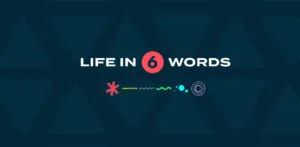 Have you ever known a dude who meant well, but couldn’t quite connect the dots socially; someone who was sincere, naïve and, well, but not all that bright when it came to relationships? Usually we feel bad for this kind of person because he doesn’t quite get it. He tries hard asking that out-of-his-league girl out but doesn’t catch the non-verbal cues that she is just not interested in carrying on a conversation or going out or whatever. He just can’t quite connect the dots.
Have you ever known a dude who meant well, but couldn’t quite connect the dots socially; someone who was sincere, naïve and, well, but not all that bright when it came to relationships? Usually we feel bad for this kind of person because he doesn’t quite get it. He tries hard asking that out-of-his-league girl out but doesn’t catch the non-verbal cues that she is just not interested in carrying on a conversation or going out or whatever. He just can’t quite connect the dots.
Wait, that sounds like me in high school!
But sometimes not connecting the dots can actually be a good thing, especially when it comes to beyond-our-pay-grade Biblical truths. This is the case with the underlying theological issues surrounding divine sovereignty and human responsibility, especially as it pertains to salvation. When we try to connect the dots in terms of election and evangelism it can, not only frustrate our theological systems, but fry our puny brains.
I believe there are three dots—three theological truths—that hover out there when it comes to evangelism. And each of these dots is crucial for us to embrace as we seek to make evangelism a priority in our ministries. But the reality is that they don’t seem to fully make sense.
Dot #1: It’s God’s responsibility to save.
Jonah 2:9 makes it clear that, “Salvation comes from the Lord.” In other words, it takes an act of God to save us. We are so sinful that, in and of ourselves, we would never choose God. When Isaiah 64:6 says that our “righteous deeds are like filthy rags,” it reinforces the truth that salvation has to come from the Lord. It’s like there is a light switch in our souls that is turned off and God, through His Holy Spirit, has to reach into our hearts and flip the switch.
This is why we pray to God to save the lost. We beg Him to enable them to believe and regenerate their depraved souls. As Jesus himself said,“No one can come to me unless the Father who sent me draws him” John 6:44.
Apart from God’s intervention, there is no salvation. It’s his responsibility to save.
Dot #2: It’s our responsibility to share.
Romans 10:14 puts the mission of evangelism directly in our hands. Paul writes, “How, then, can they call on the one they have not believed in? And how can they believe in the one of whom they have not heard? And how can they hear without someone preaching to them?” The exegetical point here is that if we don’t tell them they won’t hear and if they don’t hear then they can’t believe (how’s that for a quadruple negative!)
This verse is tucked right in the middle of the broader context of Romans 9-11, which is Paul’s grand treatise on God’s sovereignty in salvation (aka “election“.) But smack dab in the middle of this teaching Paul makes it clear that, although God is large and in charge when it comes to salvation, He chooses to use us as the vehicles of sharing His redemptive message.
To drive the point further, in Acts 20:26,27 Paul says, “Therefore, I declare to you today that I am innocent of the blood of any of you. For I have not hesitated to proclaim to you the whole will of God.” The meaning behind the phrase “innocent of the blood of any of you” comes from Ezekiel 3:18,19, “When…you do not warn them or speak out to dissuade them from their evil ways in order to save their life, that wicked person will die for their sin, and I will hold you accountable for their blood. But if you do warn the wicked person and they do not turn from their wickedness or from their evil ways, they will die for their sin; but you will have saved yourself.” Paul is saying that he is not accountable for the blood of anyone dying without Jesus because he told everyone the good news of the gospel!
Are you “innocent of the blood” of those in your sphere of influence? Have you engaged everyone within your reach with the message of salvation? Sure, God is responsible to save but we are responsible to share and if we don’t, how can they hear the good news of salvation?
Dot #3: It’s their responsibility to believe.
Romans 1:19-20 reminds us that “since the creation of the world God’s invisible qualities—his eternal power and divine nature—have been clearly seen, being understood from what has been made, so that men are without excuse.”
During the GOSPEL Journey Adventure Reality Series filming, Andy, an atheist teenager, told me that I had no proof for God. I reminded him that God, through the beauty and wonder of creation, was proving his existence. Off camera one night, I told him that if he were honest with himself, he would admit there is a God and that if he listened, he could hear the distant footsteps of the Lord coming closer and closer. Boom. Boom. Boom. He told me to stop talking about it because I was freaking him out. You see, down deep inside Andy knew.
Down deep inside everyone knows that there’s a God and that it’s their responsibility to believe in Him. Nobody is going to be able to rightfully say to God, “My unbelief is your fault!”
Don’t Connect the Dots
Now you may be thinking these three dots do not connect! If it’s God’s responsibility to save, then how can it be my responsibility to share and how can it be their responsibility to believe all at the same time? And, you’d be right, these dots don’t connect…in our puny minds that is. But they do connect in the omniscient mind of God.
So it’s in the tension between these three dots that we must embrace God’s sovereignty, while bringing urgency to our evangelistic efforts. The apostle Paul, who preached about the doctrine of election more than anyone else in the New Testament, was the most passionate about getting the gospel to everyone in the early world. He learned to live in the tension by embracing the mystery of salvation and the responsibility of evangelism all at the same time.
Let’s follow his lead. Let’s pray like it all depends on God and share like it all depends on us! Beg God to save the lost and then work your hardest to be used by God to answer that prayer!
Don’t worry about connecting the dots! Take care of your own dot and trust that God will take care of His…because He will.
By the way, if you need help with your dot, download the free Life in 6 Words app. It’s a simple way to share the Gospel with family, friends, co-workers and classmates.
Start sharing the good news today!






